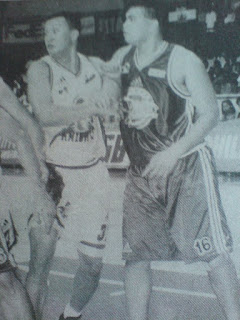Vilmer Banares of San Juan Knights against Ryan Bernardo of Laguna Lakers during the action of the 1999 season at the Ninoy Aquino Stadium.
The Official Online of the Metropolitan Basketball Association (MBA), a professional basketball league in the Philippines that ran from March 7, 1998 to July 26, 2002.
Friday, January 27, 2017
Sunday, January 22, 2017
Thursday, January 19, 2017
Wednesday, January 18, 2017
Monday, January 16, 2017
San Juan Knights (2000, team photo)
Bonel Balingit, Vilmer Banares, Omanzie Rodriguez, Philip Newton, Chris Calaguio, Chito Victolero, Macky de Joya, Rafi Reavis and others. Together with coach Philip Cesar and former San Juan City Mayor (now then senator) Jinggoy Estrada.
The 2000 MBA National Champions.
Tuesday, January 10, 2017
What's up with the MBA?
WHEN the Metropolitan Basketball Association (MBA), backed by media giant ABS-CBN was formed in 1998, the concept of regional basketball was dearly embraced by the masses, especially by fans in the provinces. Local enthusiasts from participating areas troop to their respective gymnasiums and coliseums to shower unbridled support and affection to their star players who despite not being natives of the place, were being adopted as favorite sons. The euphoria was sweet.
But beneath the hoopla and the fanfare lies the frustrating tasks and financial shortcomings of running a national league not to mention a basketball team. Due to monetary difficulties, a few teams have folded since the inception of the MBA four years ago - the inaugural champs Pampanga Dragons, Pangasinan Presidents (Waves), Iloilo Megavolts, Pasig-Rizal Pirates and the Manila Metrostars, to name only few weren't around when the 2001 season beckoned.
In 2002, the fans will surely miss the effervescence of the Laguna Lakers and the multi-titled champions San Juan Knights which disbanded at the end of last year. The loss of San Juan Knights left the National Capital Region (NCR) without representation in the MBA. Even reports are indicating that the Negros Slashers are barely breathing after the pull-out of ABS-CBN funding despite two runner-up finishes in 2001.
Internal bickerings also mired the fledgling league, a series of commissioners have been paraded since its birth. It could be recalled that Mon Fernandez resigned with an aching heart two years ago while Ogie Narvasa's stint was mired by "pro-Estrada" "pro-San Juan Knights" allegations. At the outset of 2002 interim commish Butch Antonio was replaced by former PBA defensive specialist Chito Loyzaga.
Tapped by MBA chairman Santi Araneta and Cebu Gems owner Jean Henri Lhuillier, Loyzaga's main task is the continuing existence and the survival of the MBA even without the financial presence of ABS-CBN. In 2002, the league is assured of seven teams, four in the North - Batangas, Pangasinan, Pampanga and Olongapo - and three in the South - Cebu, Negros, Davao.
For the television coverage of the games, the MBA has inked a 37-week contract with the Nation Broadcasting Network (now PTV 4), making the government channel its new home in lieu of the ABS-CBN regional network coverages which aired the games on a delayed basis to complement the live broadcast on NBN in 2001. Before 2001, the MBA Games were shown live on Studio 23, the UHF affiliate of ABS-CBN, from 1998 until 2000.
Sans the Lopez-owned network, who was steering the directions of the MBA, the new thrust of the league is not to compete head-on with the PBA but to work side by side with Asia's first play-for-pay basketball league. Loyzaga also has plans, although not this season, to implement major changes, like salary cap restrictions, Department of Justice certifications for Fil-foreign players' introduction of junior players in a conference. There was also a buzz of a merger with the amateur farm body Philippine Basketball League (PBL) but the report fizzled out for the time being. Last season, the MBA started incorporating main sponsors' name in the team titles like Andok's San Juan Knights, LBC Batangas Blades and FedEx Laguna Lakers not only to augment funding but to provide a medium for companies to advertise their products.
For now, despite the aura of calmness projected by the league's hierarchy and the return of Pampanga and Pangasinan to the fold, it is apparent that the MBA is in dire straits. The support of loyal fans may not be enough to save the league from going under unless a giant company like ABS-CBN surfaces to play Santa Claus. But it pays to be optimistic, we don't know what the future may bring. We'll see everything in April when the 5th season of the country's first regional league is delivered to our doorsteps.*
Sans the Lopez-owned network, who was steering the directions of the MBA, the new thrust of the league is not to compete head-on with the PBA but to work side by side with Asia's first play-for-pay basketball league. Loyzaga also has plans, although not this season, to implement major changes, like salary cap restrictions, Department of Justice certifications for Fil-foreign players' introduction of junior players in a conference. There was also a buzz of a merger with the amateur farm body Philippine Basketball League (PBL) but the report fizzled out for the time being. Last season, the MBA started incorporating main sponsors' name in the team titles like Andok's San Juan Knights, LBC Batangas Blades and FedEx Laguna Lakers not only to augment funding but to provide a medium for companies to advertise their products.
For now, despite the aura of calmness projected by the league's hierarchy and the return of Pampanga and Pangasinan to the fold, it is apparent that the MBA is in dire straits. The support of loyal fans may not be enough to save the league from going under unless a giant company like ABS-CBN surfaces to play Santa Claus. But it pays to be optimistic, we don't know what the future may bring. We'll see everything in April when the 5th season of the country's first regional league is delivered to our doorsteps.*
Subscribe to:
Comments (Atom)















